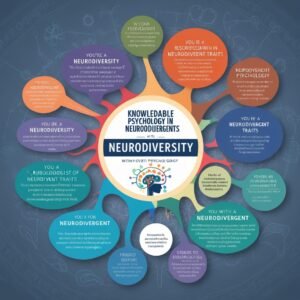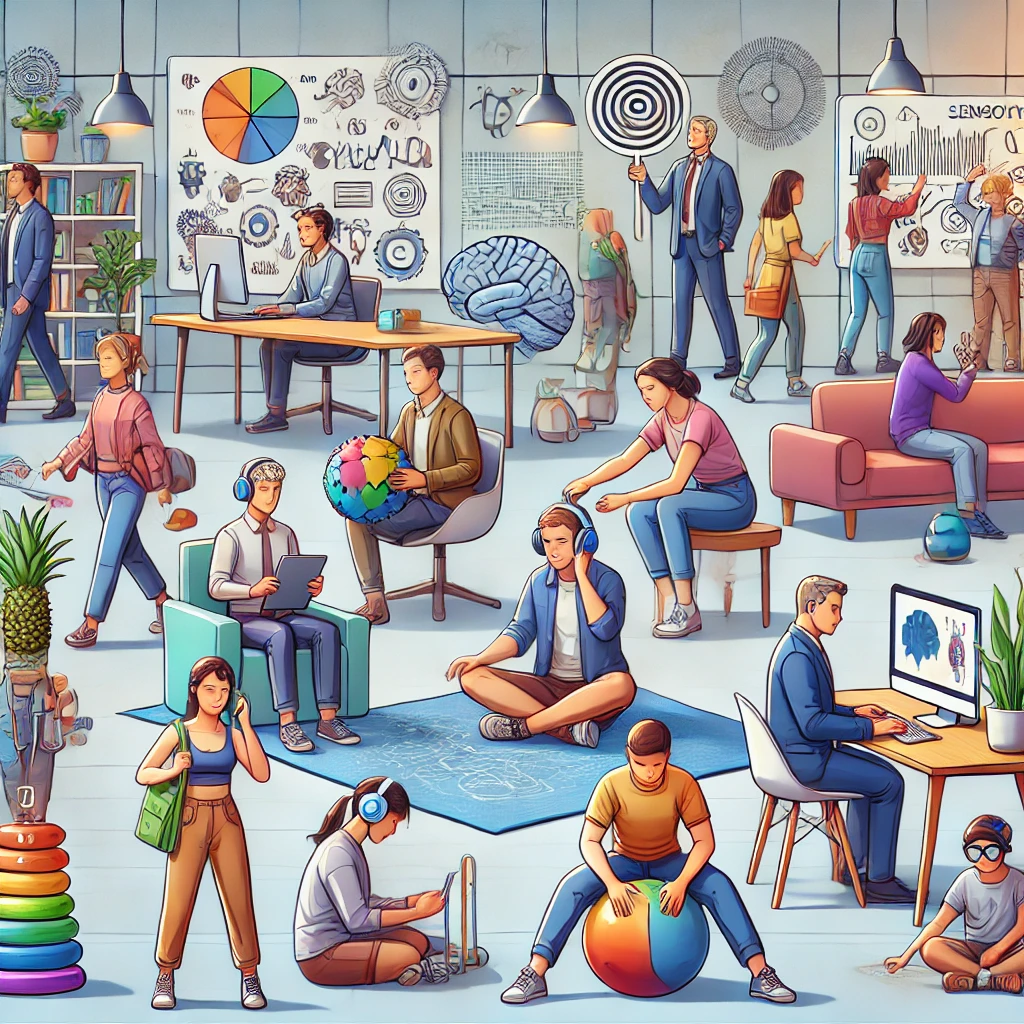Neurodivergence, a term encompassing various neurological differences such as autism, ADHD, dyslexia, and more, is increasingly recognized in today’s world. As we advance into 2024, understanding these differences has become more nuanced, reflecting the latest research and societal changes. Below, we delve into the 12 signs that you may be neurodivergent this year, highlighting the most current insights and updates.
1. Sensory Sensitivities
One of the most prominent signs of neurodivergence is heightened sensory sensitivity. Individuals may experience overwhelming reactions to sensory inputs such as loud noises, bright lights, or certain textures. In 2024, research emphasizes that these sensitivities can be a significant indicator of neurodivergence, particularly in autism and ADHD.
2. Difficulty with Executive Functioning
Neurodivergent individuals often struggle with executive functioning skills. This includes challenges with organizing tasks, managing time, and prioritizing responsibilities. Advances in psychological research highlight that these difficulties are more pronounced in conditions like ADHD and autism, affecting daily productivity and life management.
3. Unconventional Learning Styles
If you find that traditional educational methods do not suit your learning preferences, you might be neurodivergent. such as needing visual aids or hands-on experiences are commonly associated with neurodivergent conditions like dyslexia and ADHD. The latest studies suggest that embracing diverse learning approaches can significantly benefit these individuals.
4. Hyperfocus and Distractibility
A key sign of neurodivergence is extreme focus on specific interests (hyperfocus) paired with easily losing attention on other tasks. This duality is particularly notable in ADHD, where individuals may excel in areas of intense interest but struggle with tasks outside these realms.
5. Social Interaction Challenges
Many neurodivergent individuals face difficulties in social interactions. This can manifest as challenges in understanding social cues, maintaining eye contact, or engaging in small talk. Updated research indicates that these social interaction patterns are not merely about social skills but are integral to the neurodivergent experience.
6. Unusual Patterns of Thought
Unconventional thought processes or problem-solving methods are another sign of neurodivergence. Individuals might approach problems in innovative ways or exhibit unique patterns of thinking that differ from the norm. In 2024, these distinct cognitive patterns are increasingly recognized as valid and valuable.
7. Need for Routine
A strong preference for predictable routines and resistance to changes in daily activities can indicate neurodivergence. This is particularly evident in individuals with autism, who often thrive in structured environments and may find unexpected changes distressing.
8. Emotional Regulation Difficulties
Challenges in regulating emotions are common among neurodivergent individuals. They might experience intense emotional responses or have difficulty managing their feelings, which can be linked to conditions such as ADHD and autism. Recent studies suggest that tailored emotional support can greatly aid in managing these difficulties.
9. High Sensitivity to Criticism
Many neurodivergent individuals are highly sensitive to criticism. This heightened sensitivity can affect self-esteem and interpersonal relationships. Research has shown that understanding and addressing this sensitivity with empathy and constructive feedback is crucial for supporting neurodivergent individuals.
10. Unique Sensory Processing
Distinct sensory processing abilities, such as heightened or diminished responses to sensory stimuli, are often seen in neurodivergent individuals. For instance, some may have a high tolerance for pain or a low sensitivity to temperature changes. These unique sensory experiences are increasingly recognized as a core aspect of neurodivergence.
11. Variability in Energy Levels
Fluctuations in energy levels and activity can be a sign of neurodivergence. Some individuals may experience bursts of high energy followed by periods of low energy. This variability is particularly noted in conditions like ADHD, where managing energy levels can be a significant challenge.
12. Intense Focus on Specific Interests
A pronounced focus on niche interests or hobbies can be another indicator of neurodivergence. Individuals might develop an exceptional depth of knowledge in specific areas, a trait commonly observed in autism and ADHD. Embracing these interests can be both fulfilling and indicative of neurodivergent thinking patterns.
Understanding these 12 signs of neurodivergence in 2024 helps us recognize and appreciate the diversity of neurological experiences. Embracing these differences with informed perspectives fosters a more inclusive society where neurodivergent individuals can thrive.
What are Neurodivergent Traits?
Neurodivergent traits refer to characteristics or behaviors associated with neurological variations that differ from what is typically considered “neurotypical” or standard brain functioning. These traits are often seen in individuals with conditions such as Autism Spectrum Disorder (ASD), Attention Deficit Hyperactivity Disorder (ADHD), dyslexia, dyspraxia, and other neurological differences.

Common Neurodivergent Traits:
- Unique Learning Styles:
- People who are neurodivergent may learn in ways that differ from conventional methods, such as needing more visual aids, hands-on activities, or unconventional approaches to problem-solving.
- Hyperfocus:
- Some individuals with ADHD or ASD can become intensely focused on specific tasks or interests, often leading to deep expertise or mastery in those areas.
- Sensory Sensitivities:
- Many neurodivergent people experience heightened or reduced sensitivity to sensory stimuli, such as light, sound, touch, or smell. This can result in either sensory overload or a craving for more sensory input.
- Stimming Behaviors:
- Stimming refers to repetitive movements or sounds, like hand-flapping, rocking, or repeating words. It’s often used as a way to self-soothe or manage emotions.
- Social Communication Differences:
- Individuals with neurodivergent traits may communicate differently, perhaps finding it challenging to read social cues, engage in small talk, or maintain eye contact. They might also express themselves more directly or with more precision.
- Pattern Recognition:
- Some neurodivergent individuals excel at recognizing patterns, whether in data, visual information, or behaviors. This can be a significant strength in fields like mathematics, coding, or analytical roles.
- Emotional Intensity:
- Emotions may be experienced more intensely, leading to either heightened sensitivity or difficulty regulating emotional responses.
- Executive Functioning Challenges:
- Some may struggle with tasks like organizing, planning, time management, and following through on multi-step processes, often seen in ADHD.
- Creative Thinking:
- Neurodivergent people often approach problems in unique ways, leading to innovative solutions and out-of-the-box thinking.
- Routine and Predictability:
- For many on the autism spectrum, routine and predictability are essential for managing anxiety and maintaining a sense of control.
Embracing Neurodiversity
Neurodivergent traits are part of the natural variation in human neurology. Recognizing and valuing these differences can lead to more inclusive environments where diverse ways of thinking and processing are celebrated and accommodated.
Neurodivergent Brain Symptoms & Mental Health Conditions
Understanding Neurodivergence
Neurodivergence refers to the diverse ways in which the human brain can function, processing information, emotions, and sensory input differently from what is typically considered “neurotypical.” Individuals who are neurodivergent may have unique neurological traits that affect how they interact with the world, and these traits can be linked to specific mental health conditions.
Common Neurodivergent Brain Symptoms
- Sensory Sensitivities:
- Heightened or reduced sensitivity to light, sound, touch, taste, or smell. Some may experience sensory overload in environments that are too stimulating, while others may seek out additional sensory input.
- Executive Functioning Difficulties:
- Challenges with organization, time management, task initiation, and follow-through. This can manifest as difficulty in planning, prioritizing, or completing multi-step tasks.
- Social Communication Differences:
- Difficulty understanding or responding to social cues, engaging in small talk, or interpreting body language and tone of voice. This can lead to misunderstandings in social interactions.
- Stimming Behaviors:
- Repetitive movements or sounds, such as hand-flapping, rocking, or verbal repetitions, often used as a coping mechanism to manage emotions or sensory input.
- Hyperfocus or Attention Variability:
- The ability to become deeply engrossed in specific interests or tasks, often to the exclusion of everything else. Alternatively, individuals may struggle with maintaining attention on tasks that don’t engage them.
- Emotional Intensity:
- Experiencing emotions more intensely, whether it’s heightened sensitivity to criticism, greater empathy, or difficulty regulating strong emotional responses.
- Pattern Recognition:
- A heightened ability to recognize patterns in data, visual stimuli, or behavior, which can be a strength in analytical tasks but may also contribute to rigid thinking.
Mental Health Conditions Associated with Neurodivergence
- Autism Spectrum Disorder (ASD):
- A developmental condition characterized by challenges with social interaction, communication, and repetitive behaviors. Individuals with ASD often have unique sensory experiences and may engage in stimming behaviors.
- Attention Deficit Hyperactivity Disorder (ADHD):
- A condition marked by inattention, hyperactivity, and impulsivity. People with ADHD may struggle with executive functioning and maintaining focus, but they may also experience periods of intense concentration (hyperfocus).
- Dyslexia:
- A learning difference that affects reading and language processing. Individuals with dyslexia may have difficulties with reading fluency, spelling, and writing, but often excel in creative thinking and problem-solving.
- Dyspraxia:
- A condition that affects motor coordination and planning. Those with dyspraxia may find tasks requiring fine motor skills challenging and may have difficulty with spatial awareness.
- Anxiety Disorders:
- Neurodivergent individuals may be more prone to anxiety, particularly social anxiety or generalized anxiety disorder (GAD), due to the challenges they face in navigating a neurotypical world.
- Obsessive-Compulsive Disorder (OCD):
- Some neurodivergent people may experience OCD, characterized by repetitive, intrusive thoughts (obsessions) and behaviors (compulsions) that they feel compelled to perform.
- Depression:
- The emotional intensity and social difficulties associated with neurodivergence can contribute to feelings of isolation, leading to depression.
The Importance of Support and Understanding
Understanding the connection between neurodivergent brain symptoms and mental health conditions is crucial for providing appropriate support. Recognizing that neurodivergent individuals may experience the world differently helps create more inclusive environments where their unique strengths are valued, and their challenges are addressed with compassion and understanding.
Promoting awareness and acceptance of neurodiversity not only benefits neurodivergent individuals but also enriches our collective understanding of the diverse ways in which the human brain can function.











